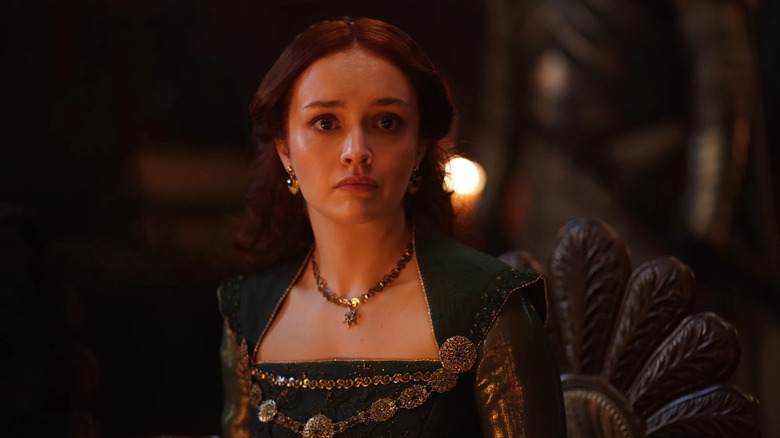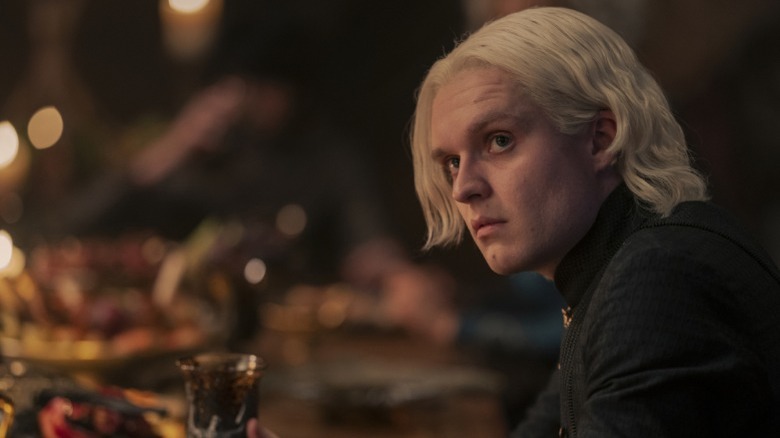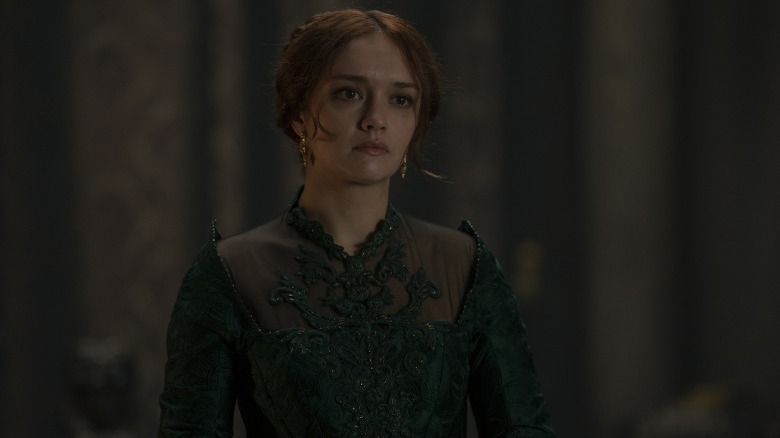How House Of The Dragon Kept Alicent From Becoming A Villain In The Aftermath Of Aegon's Assault
The world of Westeros is a bit like the world of "Succession." You can pick a favorite character based on their charm or wit or general kicked-puppy look, but the chances are, anyone you end up loving is still going to commit atrocious human rights violations at some point or another. It's a part of the game of thrones: like Cersei Lannister once said, you win or you die. And to win, the characters in "House of the Dragon" resort to some pretty terrible things.
That includes the insidious actions of Alicent Hightower (Olivia Cooke), who has spent much of the series making decisions either to appease her father or her now-dead husband. While many of Alicent's more questionable moves are forgivable, like marrying her bestie's dad because the patriarchy needs her to, others, like nearly gouging a kid's eye out, are a little less understandable. But few moments in her story so far have been as dark as the one in episode eight, when Alicent gaslights and possibly bribes a traumatized servant, Dyana (Maddie Evans) into keeping silent about her assault by Alicent's vicious son, Aegon (Tom Glynn-Carney).
'She's doing ugly things'
In an interview with The Hollywood Reporter, director Geeta Patel spoke about the nuances that went into crafting that scene between Alicent and Dyana, and how the series works hard to keep her sympathetic even after she does something that seems unforgivable. Patel says that Evans' audition brought her to tears, and that she "conveyed the vulnerability" and "the tragedy" of the character, whose trauma we don't see, only hear about after the fact.
"And then Olivia stepped up for the occasion," Patel told the outlet. "Because the big challenge of this episode was, I really wanted to be in Alicent's shoes. I didn't like her anymore. So coming into this episode, we needed to love her." The filmmaker says one goal of that episode was to plant viewers in Alicent's point of view, and "make this like a day in the life of a working mom." Only, in Alicent's case, that day involves protecting the reputation of her ruthless son. Is it a terrible choice? Absolutely, but Patel says to her it was important that she not come across as a total villain.
"You see when she's doing ugly things, but you understand her vulnerability," the director shared. "You understand she's picking between two evils." That vulnerability shines through, frankly, in large part due to Cooke's riveting performance. The scene is somewhat simple, just a conversation between two people, yet you can sense not only her anguish, but her weariness and deep resignation, too. From one scene alone, viewers get the sense that not only is this not the first time Aegon has been violent towards women — Alicent isn't surprised in the least — but also that the royal decided long ago she would protect her family even if it meant actively hurting someone else.
Cooke makes us want to root for Alicent
Depending on your reading of it, there's also a sense of nearly stifled mercy to the scene. At first, Alicent seems to be threatening Dyana, but it seems more likely she's actually bribing her so she'll shut up and disappear. Is that much better? No, but if other people around her would kill the poor girl to protect the future king (see: that time Larys killed his family after they inconvenienced Alicent), she might think she's being as helpful as she can.
"That scene had always worried me because I wanted so desperately for us to understand Alicent, but the words she's saying and actions she's taking are all quite harsh and in line with a villain," Patel shared. "Then Olivia brought so much dimension. I remember after her first take, I was like, 'Oh, thank God.' She brought everything, and so much more than I could have even thought of."
In the extremely complex moral fabric of "House of the Dragon," will Alicent go down in history as a villain? Even if the world doesn't know how she undermined an assault survivor, audiences do, and that's not something we'll soon forget. Yet it's a testament to Cooke's great work that it's still possible to look into Alicent's eyes and see someone we want to root for.


